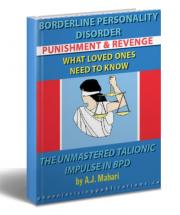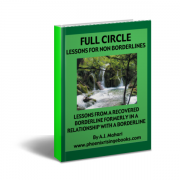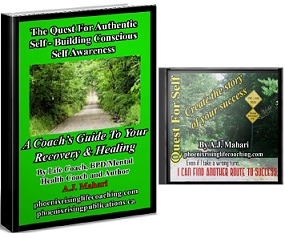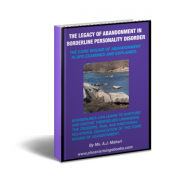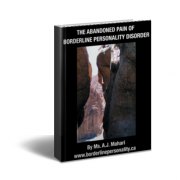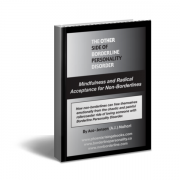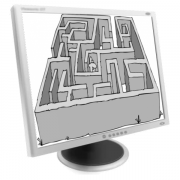Enigma of BPD Revealed and Understood
For help with understanding and gaining awareness about the Enigma of BPD, BPD Coach A.J. Mahari can help you whether you have BPD or are a loved one or Ex-loved one of someone with BPD.
For many who are diagnosed with Borderline Personality Disorder, as well those who are family members, loved ones, ex or relationship partners (non borderlines) of someone with Borderline Personality Disorder, BPD can be a complex enigma that isn't well understood.
An enigma is a mystery; a perplexing and usually ambiguous statement or riddle; a perplexing or baffling or inexplicable matter or person. To more people than not Borderline Personality is an enigma.
Borderline Personality Disorder (BPD) is diagnosed with an individual meets a minimum of 5 out of 9 detailed characteristics (personality traits). BPD Defined and to make matters more complicated the traits that delineate BPD are also found in the general population (non-personality-disordered-healthy people). The distinguishing factor as to whether someone is has BPD or not is the presentation of the number of traits along with the duration and intensity to which they are observable (and experienced).
Despite all that is known about BPD it seems that there is equally as much that remains an enigma. BPD is still largely misunderstood by clinicians, therapists, those around people with BPD and to some degree by borderlines themselves. However, as more people recover and as we tell everyone else what we've experienced and endured in the living, from the inside out, of a borderline existence, I think slowly more is being revealed and understood continually about BPD.
A very obvious dichotomy present in the lives of non-borderlines in relationships with or to borderlines, and many borderlines, themselves, is the gap that exists between intellect and emotion. Borderlines often "know" intellectually that which they do not "know" emotionally. There is often a gap between "adult-like" and age-appropriate intellect and "child-like" and age-inappropriate emotionally-motivated behaviour. I believe this is due to the damage suffered emotionally which leads one to be borderline in the first place which interferes with normal emotional development. This gap is made more evident by the triggered-dissociation that most borderlines experience. When one is triggered (dissociation) back to another times and experience one's intellect cannot over-compensate. Thus we see "regressive" "child-like" behaviour from borderlines, who are otherwise very intelligent adults.

I am not a mental health professional or a therapist, I am a person who has recovered from BPD. I am also a Life Coach and Strategist and as such I am here to say to you that the enigma of BPD has been revealed to me and is understood by me. No, not me alone. But what I am going to go on here to say is very much what I believe the essence of BPD to be as someone who lived with it, actively, for 35 years before finding recovery over a decade ago now.
I believe that BPD is a relational disorder; that it results from not forming bonds (with parents or caretakers) that are necessary for healthy human emotional development. When one is not able, for whatever reasons to form these very primary bonds one's relationship to self is severely disrupted. When one's relationship to self is compromised so is one's ability to relate to anyone else.
With BPD, borderlines in relationships, more often then not are re-experiencing and trying to work out past unresolved conflicts with parents (or caretakers). They are trying to undo the damage and heal the wounds. Sadly, however, often what they end up doing is increasing the size of the wounds and causing more damage to themselves as well as to those who try to love them. This may sound over-simplified, but this is what I know I went through. It wasn't until I was able to learn how to relate to others for the people that they are instead of extensions of myself and until I was able to emotionally mature beyond the child-like psychic reality of being the centre of the universe that I was able to begin to bridge the gap between my intellect and my emotional development.
In my opinion, the enigma of BPD, revealed, is simply that borderlines did not have their primary needs met during development in ways that were nurturing and soothing and that would allow them to emotionally develop "healthy personalities".
This is the The Legacy of Abandonment that results from the abandonment and the shame of abandonment that is re-experienced in the daily lives and relationships of those with BPD due to the on-going impact of the core wound of abandonment in those with BPD.
Those who are non borderline can learn more about understanding the ins and outs of what are so enigmatic on the other side of Borderline Personality Disorder in my Audio Program Inside the Borderline Mind and by finding out more about what I have identified as 10 Main Key Facts that all non borderlines will benefit from better understanding about BPD.

Having lived this reality I fully-well understand what happens to the human heart, psyche and ability to relate when one is abused, neglected and or damaged. It is an experience of emotional death. We survive the emotional death by developing a complex and tremendously maladaptive series of defense mechanisms which are all designed to keep us from our "original pain" (Bradshaw). It is that "original pain" that when addressed can set a borderline free from Borderline Personality Disorder.
Borderlines have not learned how to relate in healthy ways. Borderlines have not experienced the world as loving, fair or trustworthy place. Borderline ambiguity is born from the two-faced damage of the betrayal of a parent, both parents and or one's primary care-givers.
What causes borderlines and non borderlines alike so much pain and what appears to be such an enigma often to those on the other side of BPD is the fact that so much of it fails to make rational, logical sense in the here and now. At the heart of the enigma of BPD is the reality that those with BPD have their here and now consistently obliterated by the past. A past that is re-lived through the triggers that cause borderlines to experience emotional dysregulation that leaves them re-experiencing their past over and over again in dissociative ways that diminish or totally block their awareness to the actual un-folding shared reality of the non-personality disordered here and now. This reality about those with BPD sets up what are essentially parallel worlds of experience. This parallel reality of experience between the borderline and the non borderline makes understanding so much about BPD for those who care about someone with it so enigmatic. BPD can be so puzzling to those who love or care about someone with BPD that they end up losing themselves to The Puzzle and Mystery of Hope on the Other Side of Borderline Personality Disorder - a puzzle deeply rooted in the enigma of all the confusion and heartache of having a loved one with BPD and an engima from which non borderlines need to learn their own Lessons so that they can Break Free from the BPD Maze and find their own recovery - non borderline recovery.
A formidable aspect of the engima of BPD is realized when one stops to think about just how many people's lives are thrown into painful and chaotic places and situations because of this personality disorder. This is true of those diagnosed with BPD and is also true of those who love and/or care about someone with BPD. Solving the enigma of BPD was part of my recovery from it. Having lived on both sides of BPD it is now my hope that something that I share from my own experiences as someone who recovered from BPD, had 2 parents with BPD and a relationship (after my recovery with BPD) with someone with BPD/NPD will help others to further understand whatever aspects of the enigma of BPD that still has them trapped in toxic relating, and in the pain of the pursuit of connections and bonds that just can't be sustained in healthy ways - not until the person with BPD gets professional help and finds his or her way to recovery.
Borderline Personality Disorder need only be an enigma, for the person with it or the non borderline, if you are still seeking to deny it; or if you are still seeking to not feel the pain that exists within you based on your past experiences (or based upon the turmoil and pain of a one-way relationship if are a non borderline). You can make your life an enigma revealed too if you want to. Yes, it will hurt. What you really need to ask yourself, if you are borderline is, how much more will it hurt if you do nothing to heal? And if you are a non borderline, how much more do you have to give? How much more can you risk losing yourself to the person - and/or trying to rescue the person - with BPD in your life?
Both the borderline and the non borderline have to get honest with themselves in order to truly come to the kind of understanding that can and will reveal the engimal of BPD to you. The enigma that your denial and/or fear of loss - borderline or non borderline - may have you continuing to invest in.
© Ms. A.J. Mahari February 15, 2000 with additions November 16, 2008
A.J. Mahari is currently writing a memoir about her life and experience as a person who had two parents with Borderline Personality Disorder, as a person who was diagnosed herself with BPD at the age of 19 and from her perspective as someone who has recovered from BPD. There is a new section on her BPD Blog called The Diary - My Borderline Years where A.J. Mahari shares snipets of experience from her own life that is will give you just a taste of what her memoir will include.
Audio Program "Preparing For Recovery From BPD" Parts 1 & 2 by A.J. Mahari
Audio Program Rage Addiction in BPD by A.J. Mahari (sold separately or packaged with Mahari's Ebook, "Rage and BPD")
- Purchase all 3 of ebooks for NON BORDERLINES
- Non Borderlines - You can purchase 6 ebooks packaged together with or without audio.
- Those with BPD and/or Non Borderlines can purchase A.J. Mahari's 3 "Core Wound of Abandonment" series ebooks packaged together with or without audio.






